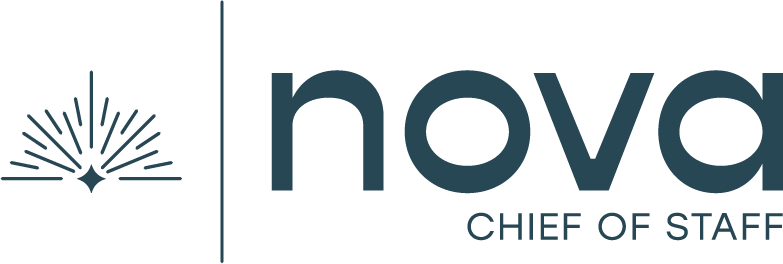Chief of Staff: Corporate or Startup?
What's the difference between being a Chief of Staff at a startup and a corporate company, and what are the key aspects of the role?
Nova Chief of Staff Founder Maggie Olson comes from a corporate background, while Ask a Chief of Staff Founder Clara Ma has worked primarily in the startup world. Together, they co-hosted a webinar discussing the similarities and differences in Chief of Staff roles at corporate companies vs. Startup ventures. Former Chief of Staff and Nova Career Coach Katie Montbriand facilitated the hour-long webinar, including a Q&A session based on audience questions.
Guest-Authored by Andrea Brewster
I’ve been following all three leaders on LinkedIn since beginning my journey to learn more about the Chief of Staff role. I love seeing people in the same field, who could traditionally be seen as competitors, collaborate to share their wisdom for the benefit of the collective.
I found it super helpful as someone who loves startups' dynamic, nimble energy and the structure, impact, and scale of corporate companies. It was refreshing to hear others feel the same. The Zoom chat was popping off as soon as we started, and someone even created a Google sheet for opt-in sharing of contact details—big Chief of Staff energy right there!
The webinar was focused on growth, coaching, and learning and was jam-packed with useful tips. Here are a few I loved:
Flex Your Project Management Muscle
The essential function of a Chief of Staff in any business is to be an executive thought partner. They're excellent at operational execution and can pick up whatever the company needs depending on its current scale, priorities, and challenges. That could mean anything from investor updates and fundraising to HR, finance, and finding a new office.
Because of this, efficient project management is a core skill. Maggie shared this blog about how to be an excellent executive project manager, which was super relevant.
Scope and Scale
The Chief of Staff role changes dramatically depending on the stage of your business, from Seed to Series A, B, and beyond. The image below, provided by Clara, shows how it’s about complementing your principal and being a pure operational generalist in the early stages, doing whatever is needed to take the business from 0 to 1.
In later stages, as the business evolves, it’s more about leaning into strategic thought partnership and being a force multiplier for your principal, keeping the business running well so they can focus on strategic priorities such as fundraising.
Corporate Considerations
The Chief of Staff role can look very different in the corporate world for several reasons. There’s likely to be a larger executive team, as well as more internal and external stakeholders. The level of polish on presentations and documentation will need to be higher, but your available resources (more headcount, more budget) will also be greater.
You also may not be the only Chief of Staff; there could be multiple Chiefs of Staff to executives ranging from President and CEO to EVPs, VPs, or even Directors. In this environment, there are more complex hierarchies and relationships to navigate.
It’s All About the People
Regardless of whether you’re a Chief of Staff in a startup or corporate environment, the most important competency for the role is high EQ, or emotional intelligence, and the ability to build trust. Having great people skills is essential, and you can hone this skill in any role.
Confidence is also key—you need to be able to speak up, run meetings, and share your feedback in a considered way.
Networking and building relationships are the main ways people on the call got their Chief of Staff roles, and this happens both inside and outside your current company. The CoS role continues to evolve, and you can shape it as your company grows if you’ve invested in those relationships and proven yourself as a trusted operator.
Making the Transition
When thinking about your next role, investigate the relationship between your passions, skills, and what the market needs (Ikigai), and use that to guide what opportunities you pursue. Be super specific about the kind of business you want to work in, including industry, product, and stage. Use that to help shape your narrative—this will also help people you meet connect you to the right opportunities.
Chiefs of Staff are experts at 'figuring it out'—this doesn’t mean you need to be an expert on the industry, but you do need to be able to learn quickly and understand what the company needs, with the confidence to speak up, step in, and do it.
Time Well Spent
Thank you to Maggie, Clara, and Katie for a very well-run webinar, and to the 100+ Chiefs of Staff on the call for their insights and questions. A true community of people helping each other to grow into their next steps!
Listen to the full Corporate vs. Startup Chief of Staff webinar from the Nova Events page. To learn more about Nova’s Chief of Staff Certification, download our Syllabus.
Andrea Brewster is an ‘ambitious generalist,’ community builder, and change leader driven by her purpose of creating positive impact. She’s currently an Operations Transformation Consultant at Xplor Technologies, a global fintech scaleup with 2,500 employees. Andrea is based in London, and available for her next opportunity to scale a business with impact.



